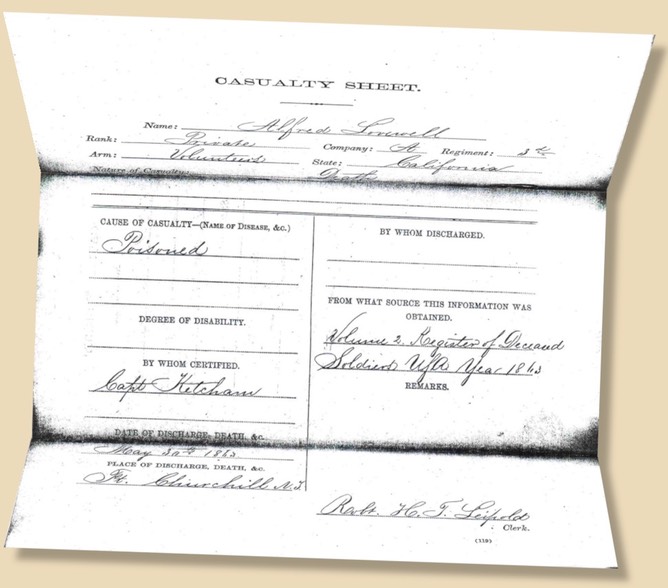
There are a few phrases I google from time to time, hopeful that something new might turn up. This is one of those fortunate times.
Thomas Lovewell and his kid brother Alfred signed up almost simultaneously for the 3rd California Volunteers in September 1861. Thomas would barely survive the war, staggering away from Fort Churchill with a medical discharge, a victim of phthisis, a pulmonary malady. Alfred was buried in the fort’s small graveyard after falling prey to a plate of poisonous greens. One of the phrases I sometimes use as bait when I dangle a hook into the digital information stream, is “eating poisonous greens.”
What I snagged this time was a letter published in a California newspaper in 1912, written by a man who had served at Fort Churchill with the Lovewell brothers and with Jeremiah Wagstaff, the unfortunate private who drowned in the desert the same month Alfred Lovewell died.
On this Veterans Day it seemed especially fitting to give Thomas and Alfred Lovewell’s old comrade-in-arms Daniel Maloney a forum for a veteran's reflections on war.
Editor Lompoc Journal: Permit me to give my view on some American wars of which I read much, and some of which I was in.
All war is barbarous, costly, and keeps the masses in poverty. The American Revolutionary war, so highly extolled in Fourth of July orations, was fought on the principle that taxation and representation should be inseparable, yet women to this day are taxed without representation, except in half a dozen states. Norway, Australia, and New Zeland are far ahead of this country in this respect.
The war of 1812 was fought for “Free trade and sailor’s rights,” but not a word was said about either in the treaty of peace. That war was a failure on land but not on the water. General Jackson’s victory at New Orleans was gained two weeks after the treaty of peace was signed at Ghent. An electric telegraph then would have saved the lives of hundreds of brave British soldiers. History tells us that Jackson had but 7 killed and 8 wounded. Jackson’s stubborn Irish blood saved New Orleans, and if General Hull had had some of the same quality in him Detroit and the North West might have been saved from the British and Indians.
Some historians have shamefully lied concerning the Mexican war, partly from bias and partly from ignorance. That war was, in some respects, by far the most profitable this country has had, for it not only redeemed the valor lost in the war of 1812, but the territory acquired from Mexico, including Texas, is larger than the eleven states that seceded in 1861, and which cost billions of dollars and over 300,000 lives to subdue, and the end of the cost is not yet in sight, nor will it be until the $150,000,000 yearly pension roll and interest on the public debt are obliterated.
About one-fourth of the army that invaded Mexico was buried there in two years, and about one-eighth of the Union army was buried in the South in four years. Company C 2nd infantry, to which I belonged, lost twenty-six, exactly one-fourth, although the company was in Mexico less than fourteen months. Five companies of California volunteers attached to the 2nd Massachusetts cavalry served three years in the Army of the Potomac and had only thirteen die of sickness and twenty-five killed in battle, although the regiment was in nearly fifty battles, mostly with Mosby’s gurrillas.
Company A, 3d California infantry in which I served nearly five years lost only two; one died from eating poisonous greens, and one was drowned in Carson river Nevada. The company made a brilliant record hunting, fighting, killing and capturing Indians in Humboldt county, California.